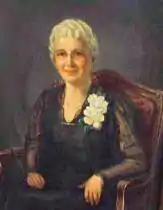Laura Freele Osborn
Laura A. Freele Osborn (1866-1955) was a suffragist, campaigner for school reform, and long-serving member of the School Board for Detroit Public Schools in Detroit, Michigan during the early half of the 20th century.
Laura Freele Osborn | |
|---|---|
 portrait of Osborn by Leon Makielski | |
| Born | 1866 Huntington, Indiana |
| Died | 1955 (aged 88–89) |
| Nationality | American |
| Occupation | Educator, Social reformer |
| Spouse(s) | |
Early life and education
She was born and raised in Huntington, Indiana.
Career
Laura F. Osborn was a prominent advocate of non-partisan school boards in Michigan, including contribution to legislation passed in 1913 and later lobbying then Governor Woodbridge Ferris to support this reform.[1]
She was first elected to the Detroit School Board in 1917, campaigning on a platform of reform. She was the first woman elected to citywide office in Detroit. She served on the school board for 38 years, until her death in 1955. During that time she was selected as board president seven times. Osborn also played a role in developing Wayne State University in the mid-1930s.[2][3]
She is also credited with having mobilized women into the cause of school reform and temperance, and also to have "broken the prejudice against women officeholders in Detroit".[4] She also ran unsuccessfully for Detroit City Council two times.
Personal life
She taught school in Huntington until her marriage in 1891 to Francis C. Osborn, a Detroit businessman and inventor.
Legacy
- Osborn High School in Detroit, built in the late 1950s, was named in her honor.
- She was inducted into the Michigan Women's Hall of Fame in 1995.
References
- Detroit Historical Society, "Person Record: Osborn, Laura Freele" (accessed 20 October 2020)
- "Laura Freele Osborn" (PDF). Michigan Women’s Historical Center & Hall of Fame. Retrieved 19 July 2019.
- Beckwith, Jamie, "Pewabic tile fountains display beauty, historical significance," The South End, April 21, 2005 (archived page)
- Detroit News, Feature entitled "Michigan Women's Hall of Fame," 1928 (no relation to the current Hall of Fame)